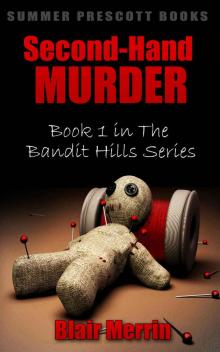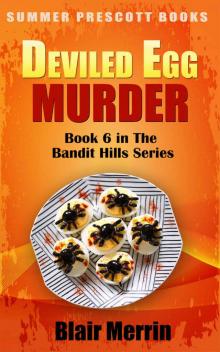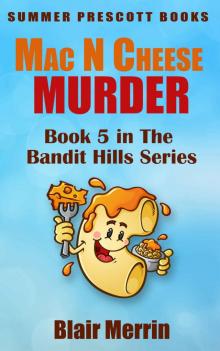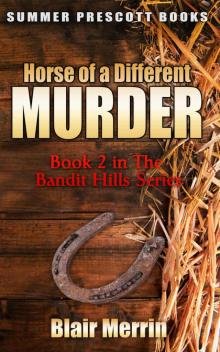- Home
- Blair Merrin
Second-Hand Murder: Book 1 in The Bandit Hills Series
Second-Hand Murder: Book 1 in The Bandit Hills Series Read online
Table of Contents
Second-Hand Murder
Chapter 1
Chapter 2
Chapter 3
Chapter 4
Chapter 5
Chapter 6
Chapter 7
Chapter 8
Chapter 9
Chapter 10
Chapter 11
Chapter 12
Chapter 13
Chapter 14
Chapter 15
Chapter 16
Chapter 17
Chapter 18
Second-Hand Murder
Book One in the Bandit Hills Series
By
Blair Merrin
Copyright 2016 Summer Prescott Books
All Rights Reserved. No part of this publication nor any of the information herein may be quoted from, nor reproduced, in any form, including but not limited to: printing, scanning, photocopying or any other printed, digital, or audio formats, without prior express written consent of the copyright holder.
**This book is a work of fiction. Any similarities to persons, living or dead, places of business, or situations past or present, is completely unintentional.
Author’s Note: On the next page, you’ll find out how to access all of my books easily, as well as locate books by best-selling author, Summer Prescott. I’d love to hear your thoughts on my books, the storylines, and anything else that you’d like to comment on – reader feedback is very important to me. Please see the following page for my publisher’s contact information. If you’d like to be on her list of “folks to contact” with updates, release and sales notifications, etc…just shoot her an email and let her know. Thanks for reading!
Also…
…if you’re looking for more great reads, from me and Summer, check out the Summer Prescott Publishing Book Catalog:
http://summerprescottbooks.com/book-catalog/ for some truly spooky stories.
Contact Info for Summer Prescott Publishing:
Twitter: @summerprescott1
Blog and Book Catalog: http://summerprescottbooks.com
Email: [email protected]
And…look up The Summer Prescott Fan Page on Facebook – let’s be friends!
If you’re an author and are interested in publishing with Summer Prescott Books – please send Summer an email and she’ll send you submission guidelines.
SECOND-HAND
MURDER
Book One in the Bandit Hills Series
Chapter 1
“One person’s trash is another person’s treasure.”
That’s my mantra, and it’s really the only thing that keeps me going as I sift through yet another donation box of old clothes, used toys, broken appliances, and worn kitchen utensils. But continue I shall, because somewhere in these boxes of things that someone else discarded so easily is a thing that someone else will look at and see as a treasure—and one person’s treasure is my livelihood.
“Cassandra,” says my mom from across the L-shaped counter.
I look up to see her wrinkling her nose as she holds up a t-shirt emblazoned with FRANKIE SAYS RELAX. I laugh.
“Oh, wow, we have to keep that,” I tell her. “I’ll bet you lunch that someone snatches that up by noon.”
Everyone else on the entire planet calls me Cassie except my mom. I think she calls me Cassandra because she knows it irks me, but I’m over it by now—mostly because I’m thirty-two, not sixteen, and because a lot of my customers know me by my other nickname, Miss Miscellanea. That’s actually the name of my store, a secondhand shop on the corner of Fifth and Main next to the tailoring shop called Sew What?
Every morning before we open up for the day, I, and my single employee—my mom—go through the donation boxes of stuff that people left in our bin the night before. There are usually only a few odds and ends, but on this particular morning there were five boxes out front, so we had our work cut out for us. We unpack each box, decide what’s salable, what we’ll donate to charity, and what’s so beyond help that it’s junk.
“Oh, lord,” Mom snorts from nearby. She plucks a faux-fur stole from the box and flings it around her neck with a flourish. “Don’t I look just mah-velous, dah-ling?”
Mom has a bit of a penchant for the dramatic, which makes her both an awesome employee and an occasionally frustrating one. On the one hand, she’ll excitedly convince a customer that a 1940s Victrola is an absolute must-have conversation piece for a living room. On the other hand, she’ll lose her mind if someone goes through the sweaters and knocks one off the hanger.
We’ve been working together for at least nine months now. Last year she retired from her long career at the bank, spent two months “enjoying” retirement, and then decided it was for the birds. She needed to work, to feel like she belonged somewhere, so I made a place for her at the store. So far, it’s actually worked out pretty great.
“Uh-oh,” I say as a shadow falls over the storefront window. “Here comes Bonnie.”
Mom cranes her neck around to see the woman standing just outside, with both hands cupped around her eyes, a wicker basket hanging from the crook of an elbow. Bonnie is, by far, our most loyal customer—and when I say “loyal,” I mean she comes in every single morning to be the first to see what new stuff we got in the night before. As if there’s going to be a stampede for secondhand goods and she might somehow miss it, right?
I roll my eyes and half-shout, “It’s unlocked, Bonnie. Come on in.”
The bells on the door tinkle as Bonnie enters, her wicker basket swinging like a pendulum from her elbow.
“Morning, ladies!” she booms.
Bonnie owns a ranch just outside of town and boards horses, dogs, cats, livestock—pretty much any animal someone brings her. She used to run it with her husband, but sadly, he passed away a couple years back, and now Bonnie runs the ranch alone—though she swears he still occasionally moves a hay bale for her.
She’s wear wearing her typical “uniform” of a flannel shirt with the sleeves rolled up the elbow, jeans, and leather boots that might have been beige at one point, but have been so sullied with dirt, dried mud and (presumably) manure over years of wear that they’ve turned to a dark brown. She speaks far louder than she needs to, probably because she’s used to shouting across wide open land at ranch-hands.
“What have we got today?” Bonnie asks, rubbing her hands together eagerly. She loves the kitschy, decorative kind of stuff that we get in from time to time. Unfortunately, I hadn’t come across any yet this morning.
“Oh, here, take a look at this,” I say, and I hold up the FRANKIE SAYS RELAX t-shirt.
Bonnie’s eyes light up. “I haven’t seen a shirt like that since 1985!” she says excitedly. “I’ll take it!”
“You owe me lunch,” I wink at Mom.
“I never agreed to that!” Mom protests with a grin. She checks her watch. “It’s almost nine, Cassie. I’ll flip the sign, if you take these…”
She keeps talking, but her voice gets lost in my thoughts as I slide the final box over. It’s a plain, unmarked shoebox, and the sides of it feel soft and somewhat moist and it smells a bit like mildew. These kinds of boxes are the worst; the ones that people left in their basement or closets for far too long, and then send my way because they feel bad just throwing the stuff out. I lift the mushy lid and my heart skips a beat.
Inside is an ugly little doll. It looks like it was made of burlap, poorly stitched together at the limbs and neck with thick black thread. Its eyes are large green buttons, and its long hair is made of some sort of long, yellow grass. But as creepy-weird as the doll is, that’s not wha
t alarms me. Beneath the doll is a photograph, in black and white, of a smiling woman. I peg her to be around mid-twenties, and she looks really happy, her eyes glancing slightly up as if she’s smiling at the person taking the picture, and not the camera itself. Both Bonnie and Mom notice my silence, because they both come over at the same time. Bonnie gingerly picks up the weird little doll, her eyes wide.
“Cassie,” she says, “Do you know what this is?”
“Uh…” I’m at a loss, and I don’t want to sound stupid and say “a doll?” So instead I ask, “Do you?”
“This looks like a genuine voodoo doll,” Bonnie says, and for the first time ever her voice is hushed, almost reverent. She says “genuine” like it’s three different words, “gen-you-ine.”
I can’t help but pinch the bridge of my nose. “Bonnie, how on earth would you know that?”
“We live in Bandit Hills,” Bonnie retorts. “How do you not know?”
She’s got a point.
“Cassie,” says Mom from over my shoulder. “Who’s that in the photo?”
I look again at the picture of the smiling woman. “I don’t know, but she seems somehow… familiar. Doesn’t she?”
Mom nods. “She sure does. She was in the newspaper just last week. I recognize the photo… from the obituaries.”
Chapter 2
We have a saying around here: “That’s Bandit Hills for ya.” It’s sort of become our unofficial town motto. When someone is sipping their sixth cup of coffee at the local diner because the ghost in their attic wouldn’t stop howling last night, we say, “That’s Bandit Hills for ya.” When Bonnie finds a fresh crop circle in the overgrown barley field behind the ranch, she doesn’t call the news station. Instead she says, “That’s Bandit Hills for ya.” When some out-of-towner’s car breaks down on the exit ramp and they wander into town because a pleasant passerby named Charlie gave them directions to the gas station, the attendant doesn’t even bother telling them that Charlie used to be the town’s mayor but sort of died sixty-three years ago. He just shrugs and says, “That’s Bandit Hills for ya.”
Bandit Hills, Tennessee is so small that if you yawned while cruising down Route 666, you might miss it. In fact, we’re not even mentioned on the sign for Exit 13, so unless you know we’re there, you wouldn’t have a reason to ever pull off. Yet people still manage to find us. Mostly tourists, people who read about strange phenomena online and want to check it out. The same kind of folks who would vacation in Roswell, or Centralia, or Tombstone—those are the people we get rolling through Bandit Hills.
Of course, if you’ve lived here your whole life like I have, we don’t call it “strange phenomena.” We call it “Tuesday.” It’s kind of like growing up with horses; if you didn’t, it seems weird and cool. If you did, it’s just normal to you.
There are a lot of different stories about how Bandit Hills was founded, because no one knows for sure. The prevailing story is that our sleepy little town’s namesake is literal; that a band of stagecoach robbers holed up here after a big heist, but they got greedy and suspicious and kind of murdered each other. (The reason it’s the prevailing story is the high number of sightings of a gunslingin’ specter roaming the halls of the motel on the edge of town. He sometimes likes to steal watches and jewelry and hide them beneath floorboards.)
This is all important to know, because when you live in a place like this, and you find a photo in a musty shoebox next to a voodoo doll, and your mother says, “Oh, that young woman died recently,” you tend not to do the typically expected thing and freak out. Instead you might shrug and say, “That’s Bandit Hills for ya.”
***
I sit in the tiny back office of Miss Miscellanea with a cup of herbal tea and the beginnings of a crazy-bad headache. The first question on my mind should be, Why did someone send me a photo of a deceased woman and a voodoo doll? But if I’m being honest, the actual question on the forefront my mind is, Why do I surround myself with people who know what voodoo dolls are and memorize obituaries?
It took me a solid fifteen minutes to convince Bonnie that I would not sell her the voodoo doll. Finally she relented, pouting, bought the FRANKIE t-shirt, and left with the promise of seeing us the next morning. Mom is manning the counter, which affords me a few minutes to sit and ponder.
What’s to think about, right? Most likely someone is playing some kind of messed-up prank that I don’t quite get. I should just chuck the doll and the photo and go back to running my business, but I just can’t get the whole strange situation out of my head.
A quick internet search proves that Mom was right, the young woman in the photo did indeed pass away just last week, of “unknown causes.” Mom says that’s what they say when they don’t want to tell you the real cause of death. Her name was Stephanie Marshall. It doesn’t ring any bells with me.
I stare at the phone on the desk for a few minutes, deliberating on whether or not to call Dash. I know I shouldn’t. I should just leave things be. Dash answers on the second ring.
“Hamilton,” he says gruffly. I almost laugh.
“Hi Dash, it’s Cassie.”
“Oh, hey,” he says. Suddenly his gruff voice is friendly, soft, and an octave higher than his greeting. “What’s up?”
Dash is a guy I’ve known since high school. He was always kind of a nerd; he loved reading science fiction novels and playing board games and getting good grades and stuff like that, but he turned out to be what Mom calls a “late bloomer.” Just a year out of college, Dash hit the gym, gained some fashion sense, and tamed his cowlick. Almost overnight he went from geek to… well, not quite chic. More like masculine…and attractive, if I’m being objectively honest here.
He even started going by “Dash” instead of “Dashiell.” Which, you can imagine, was all very weird to me, having known the guy for so long. I still look at him and see that nerdy tenth grader playing Dungeons & Dragons at lunch.
Anyway, Dash works as a private investigator. He has his own little firm that he runs out of a former apartment building, above the dentist and below a divorce lawyer. That sounds way more glamorous than it really is; even in a place like Bandit Hills, most of his work comes from insurance companies, contentious divorces, and the occasional missing pet. And me, of course. I’ve hired him twice before to track down some very coveted items that I wanted for the store, and both times he came through in a major way.
“Dash, listen, I got something super weird at the shop today.” I tell him about the shoebox with the voodoo doll and the photo inside, and I can hear the scritch-scratch of a pen against paper as he takes notes.
“Huh,” he says when I’m done.
“Huh?” I parrot. “That’s all you’ve got?”
“Well… this isn’t exactly in my wheelhouse, Cassie. I mean, it would be almost impossible for me to track down who dropped it off or why. Best I could do is find out what happened to this Stephanie Marshall, and go from there. I can call up Phil down at the station; he might be able to help us out.”
“I just want to know.”
“Sure, I get it. Curious Cassie.” I can practically hear him grinning through the phone. They used to call me that when I reported for the school paper. (I sort of had a tendency to make mountains out of molehills.) “I’ll call you back soon.”
“Thanks, Dash.”
As soon as I hang up I feel a little better. I even laugh at myself. Seriously, Cassie? Voodoo doll? Come on. Just sell it to Bonnie and make a few bucks. Before I even know what I’m doing, I’m holding the photo of Stephanie Marshall again. I’m examining her smile, her dimples, her hair… I put the photo down, face-down on the desk. That’s when I notice there’s a message on the back of it. In very neat handwriting, someone has written: Make sure it doesn’t fall into the wrong hands.
Oh, great. An ominous message. Now I definitely can’t sell it to Bonnie.
Chapter 3
To take my mind off of the doll, I fold jeans. I dust knick-knacks. I strike up
conversations with customers about their kids and spouses. I clean our glass countertop and the faces of all the curio cabinets. I don’t even notice that it’s dark out until Mom calls out to me.
“Cassandra? I fed Xerxes and flipped the sign. Lock up after me?”
I check my watch. It’s already eight p.m. “Sure thing, Mom.”
As I walk her to the storefront, she says, “I’m going to meet Marla for pie at the diner. Do you want to come?”
“No thanks. I’m going to go through the receipts and then head upstairs. It’s been a long day.”
“Okay, honey.”
She kisses my forehead and journeys out into the night, the bells on the door tinkling in her wake. I follow her out. It’s a bit brisk for a t-shirt. Soon late summer will give way to early autumn—which, perhaps needless to say, is not only Bandit Hills’ favorite time of year, but the most popular tourist season too.
For a long moment I just stand there and admire Main Street. Our little town hasn’t been updated since the fifties, and we like it that way. It’s breathtakingly charming. You won’t find any big-box stores or corporate chains here. That—plus the stuff you will find, whether you want to or not—is the reason most folks just come to visit, and not to stay.

 Second-Hand Murder: Book 1 in The Bandit Hills Series
Second-Hand Murder: Book 1 in The Bandit Hills Series Deviled Egg Murder: Book 6 in The Bandit Hills Series
Deviled Egg Murder: Book 6 in The Bandit Hills Series Mac N Cheese Murder: Book 5 in The Bandit Hills Series
Mac N Cheese Murder: Book 5 in The Bandit Hills Series Horse of a Different Murder: Book 2 in The Bandit Hills Series
Horse of a Different Murder: Book 2 in The Bandit Hills Series Marinated Murder: Book 4 in The Bandit Hills Series
Marinated Murder: Book 4 in The Bandit Hills Series